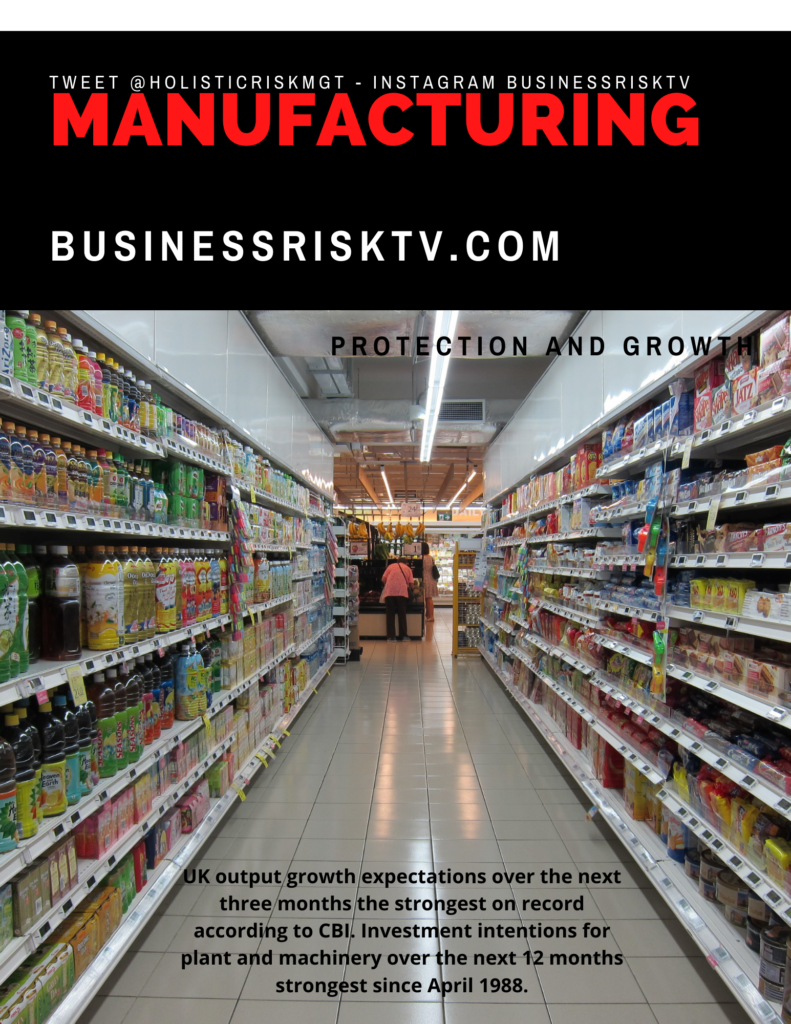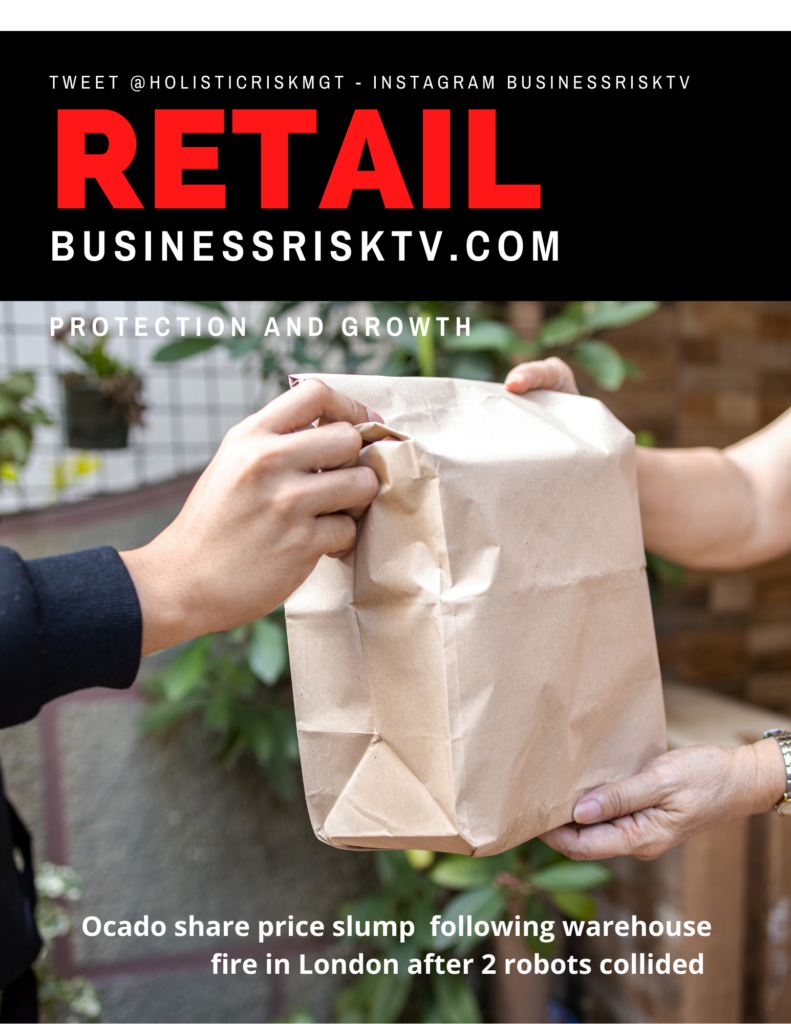



How can business leaders keep up-to-date with key risks impacting on business in the UK
UK business news opinions and risk reviews. Read news related to business in the UK. Get the latest news for free. Keep up to date with key risks which could impact on your business in the UK. Contribute your opinion to express your voice on UK business environment.
UK Business News Analysis and Risk Reviews
BusinessRiskTV is a platform that provides UK business news and reviews to businesses across the UK. The platform offers a range of resources to help businesses stay up-to-date with the latest developments and trends in their industry. This article will explore the different types of news and reviews that are available on BusinessRiskTV and how businesses can use this information to manage their risks and stay ahead of the competition.
Types of UK Business News on BusinessRiskTV
BusinessRiskTV provides a wide range of news and insights on UK business, covering a variety of industries and sectors. Some of the most common types of news that businesses can expect to find on the platform include:
Industry-specific news: BusinessRiskTV provides in-depth coverage of a range of different industries, including finance, technology, healthcare, and retail. This allows businesses to stay up-to-date with the latest developments in their industry and understand how these developments may impact their own business.
Market analysis: BusinessRiskTV provides regular market analysis, including information on economic trends, consumer behaviour, and emerging technologies. This analysis can help businesses understand how the market is changing and identify new opportunities for growth.
Regulatory updates: Businesses operating in the UK are subject to a range of different regulations and compliance requirements. BusinessRiskTV provides regular updates on changes to these regulations, helping businesses to stay compliant and avoid any potential legal issues.
Mergers and acquisitions: BusinessRiskTV also provides news and analysis on mergers and acquisitions in the UK. This can be useful for businesses that are considering mergers or acquisitions themselves, as it provides insights into how these deals are structured and what factors contribute to their success.
Risk management: Finally, BusinessRiskTV provides a range of resources on risk management, including tips and strategies for identifying and managing different types of risks. This can be particularly useful for businesses that are looking to improve their risk management practices and protect themselves against potential threats.
How Businesses Can Use BusinessRiskTV to Manage Risks
One of the key benefits of using BusinessRiskTV is that it can help businesses to manage risks more effectively. By staying up-to-date with the latest news and trends in their industry, businesses can identify potential risks before they become major issues.
For example, if a business operating in the retail industry sees that consumer spending is starting to decline, they may be able to adjust their business strategy accordingly. This could include reducing inventory levels, cutting costs, or introducing new products to attract customers.
Similarly, if a business operating in the healthcare industry sees that new regulations are being introduced, they can make sure that they are compliant with these regulations and avoid any potential legal issues.
By using BusinessRiskTV to stay informed about the latest developments in their industry, businesses can take a proactive approach to risk management and protect themselves against potential threats.
How BusinessRiskTV Can Help Businesses Stay Ahead of the Competition
In addition to helping businesses manage risks, BusinessRiskTV can also help businesses stay ahead of the competition. By staying up-to-date with the latest industry news and trends, businesses can identify new opportunities for growth and innovation.
For example, if a business operating in the technology industry sees that a new technology is emerging that could disrupt their industry, they may be able to pivot their business strategy to take advantage of this new technology. This could involve developing new products or services, or partnering with other businesses to create innovative solutions.
Similarly, if a business operating in the finance industry sees that there is growing demand for sustainable investment options, they may be able to position themselves as a leader in this area and attract new customers.
By using BusinessRiskTV to stay ahead of the competition, businesses can position themselves as industry leaders and create a competitive advantage that sets them apart from their competitors.
China’s Deflation: Spillover Risks and Implications for UK Businesses
The possibility of China “dumping” its deflation problem onto the global economy has sparked concerns, particularly for businesses in the UK. While intentional manipulation is unlikely, understanding the potential spillover effects is crucial for effective strategic planning.
Understanding Deflation
Deflation, a sustained decrease in the general price level, often indicates weak economic activity. In China’s case, factors like demographics, slowing property markets, and pandemic disruptions have contributed to falling prices.
Transmission Channels
- Reduced Trade Demand: Deflation in China could lower its import demand, impacting UK businesses that export goods there.
- Disinflationary Pressures: Cheaper Chinese imports could put downward pressure on UK prices, potentially affecting profitability in some sectors.
- Financial Market Volatility: Global markets might react negatively to Chinese deflation,leading to fluctuations in exchange rates and investment flows.
- Competitive Landscape: Chinese companies with deflated costs might gain a competitive edge over UK businesses in international markets.
Impact on UK Businesses
The severity of these effects will depend on several factors, including:
- Industry Exposure: Businesses heavily reliant on exports to China or competing directly with Chinese imports will be more vulnerable.
- Cost Structure: Companies with high fixed costs might struggle to adjust to falling prices or increased competition.
- Market Diversification: Businesses spread across diverse markets will be more resilient to regional economic challenges.
Considerations for Business Leaders
- Evaluate Exposure: Assess your dependence on Chinese markets and potential vulnerabilities to trade slowdown or disinflationary pressures.
- Cost Optimization: Explore opportunities to streamline operations and improve cost efficiency to remain competitive.
- Market Diversification: Consider expanding into new markets to reduce reliance on China and mitigate risks.
- Strategic Partnerships: Explore collaborative opportunities with other businesses to strengthen market positions and share resources.
- Innovation and Differentiation: Focus on innovation and unique value propositions to differentiate your offerings and mitigate competitive threats.
- Government Support: Stay informed about potential government measures to support businesses facing challenges related to global economic trends.
Additional Points:
- While deflationary risks exist, China is likely to take measures to stimulate its economy, potentially mitigating some spillover effects.
- The UK economy’s overall strength and diversification can provide some buffer against external shocks.
- Proactive planning and adaptation are crucial for businesses to navigate the evolving global economic landscape.
Disclaimer: This information is intended for general awareness and should not be considered as specific financial or business advice. Please consult with professional advisors for tailored guidance based on your unique circumstances.
The Perfect Storm: Rising Costs, Shrinking Investments, and the Looming Shadow of Business Closures in 2024 UK
4th January 2024 – Keith Lewis
The clouds of economic uncertainty are gathering heavy over the UK in 2024. A potent cocktail of factors, each capable of inflicting significant damage, has coalesced into a perfect storm threatening to engulf businesses and batter consumers. In this article, we’ll delve into the difficulties businesses face in securing affordable investment, the deepening consumer cost-of-living crisis, and the potential escalation of inflation fueled by freight costs in the Red Sea and the ongoing war in Ukraine. Our analysis will culminate in a stark reality: a significant rise in business closures throughout 2024.
Drought in the Investment Oasis:
Securing affordable investment has become a Herculean task for UK businesses. Skyrocketing inflation has driven interest rates upwards, creating a credit squeeze that chokes off essential capital flow. Businesses, especially smaller ones, are caught in a vice. Rising production costs demand investment, but soaring interest rates make borrowing prohibitively expensive. It’s a vicious cycle that threatens to stifle innovation and growth.
This investment drought isn’t just a domestic phenomenon. Global economic turbulence has dampened investor confidence, making the UK, despite its traditionally attractive market, a less appealing destination for international capital. The war in Ukraine, ongoing supply chain disruptions, and the looming threat of a global recession have made investors extremely risk-averse. Their focus has shifted towards safe havens, leaving many emerging and middle-income economies, including the UK, scrambling for scarce investment.
The Cost-of-Living Tsunami:
Consumers are already feeling the brunt of the economic storm. Inflation, which reached a record 11.1% in October 2023, shows no signs of abating. Rising energy bills, skyrocketing food prices, and soaring transportation costs are eroding household budgets at an alarming rate. The average household is staring down a real income loss of over 5% in 2024. This is the steepest decline in living standards in decades, and it’s pushing many families to the brink. The cost-of-living crisis is not just an economic issue; it’s a social crisis with potentially dire consequences.
Red Sea Chokepoint and the Inflationary Inferno:
Adding fuel to the inflationary fire are the escalating disruptions in the Red Sea. The recent spate of pirate attacks and political instability in the region has thrown critical global shipping routes into disarray. With container costs increasing by over 300% since the start of 2023, the impact on essential goods is undeniable. The Red Sea disruptions are a perfect storm of piracy, political unrest, and inadequate infrastructure. They’re pushing up the cost of everything from electronics to food, further fuelling inflation and exacerbating the cost-of-living crisis for consumers.
Ukraine War: Energy Shockwaves and a Looming Recession:
The ongoing war in Ukraine continues to cast a long shadow over the global economy. Disruptions to energy supplies from Russia have sent oil and gas prices soaring, pushing energy bills to unprecedented levels. The International Monetary Fund warns that the war could trigger a global recession in 2024, with the UK, heavily reliant on imported energy, facing a particularly significant economic downturn. The war in Ukraine has unleashed a shockwave through the global energy market. The UK, with its dependence on energy imports, is particularly vulnerable. If the war drags on, we could see energy prices continue to rise, pushing inflation even higher and accelerating the decline in economic activity.
Death Blow: The Rise of Business Closures:
The confluence of these disruptive forces portends a grim reality for UK businesses in 2024. Squeezed by rising costs, crippled by lack of affordable investment, and facing a consumer base with dwindling purchasing power, many businesses will simply be unable to keep their doors open. We’re on track for the worst year for business failures in decades. The current economic climate is a perfect storm for small businesses, and many will simply fall victim to the rising tide of costs and shrinking demand.
This predicted surge in business closures is not just a grim statistic; it represents a significant blow to the UK economy. Lost jobs, dwindling tax revenue, and a decline in innovation and competition will further dampen economic growth in UK.
A Call to Action: Weathering the Perfect Storm
The economic storm brewing in the UK is not an inevitable force of nature. Policymakers, businesses, and individuals all have a role to play in mitigating its impact and building resilience. Here are some potential avenues for action:
- Targeted Government Intervention: The government must implement targeted measures to support businesses, particularly small and medium-sized enterprises (SMEs), during this challenging period. This could include temporary tax breaks, loan guarantees, and grants for energy efficiency upgrades. Additionally, investing in infrastructure and skills development can bolster long-term economic growth.
- Boosting Investment: Attracting and retaining investment is crucial. Streamlining regulations, investing in green technologies, and promoting the UK as a stable and innovative economy can entice investors back to the table.
- Consumer Resilience: Individuals and families must prioritise financial planning and budgeting to navigate the cost-of-living crisis. Seeking financial advice, exploring alternative energy sources, and utilising government support programs can help weather the storm.
- Business Adaptability: Businesses need to adopt agile strategies to adapt to changing market conditions. Embracing e-commerce, diversifying supply chains, and focusing on operational efficiency can enhance competitiveness and resilience.
- International Cooperation: Global cooperation is key to tackling issues like supply chain disruptions and the Red Sea crisis. Collaborative efforts to address piracy, improve infrastructure, and stabilise regional politics can ensure smoother flow of goods and mitigate inflationary pressures.
The challenges facing the UK in 2024 are undoubtedly daunting. However, by acknowledging the gravity of the situation and taking concerted action, policymakers, businesses, and individuals can navigate the perfect storm and emerge stronger on the other side. The road ahead will be arduous, but the potential rewards of a more resilient and equitable economy are worth the collective effort. By embracing innovation, fostering collaboration, and prioritising long-term sustainability, the UK can weather the economic storm and build a brighter future for all.
Are UK consumers reducing expenditure due to the cost of living crisis or to save for Christmas?
Keith Lewis 6 November 2023
The UK is currently facing a cost of living crisis, with inflation at a 40-year high. This is putting a strain on household budgets, and many consumers are having to make difficult choices about their spending.
One of the key questions is whether the cost of living crisis is leading to a reduction in consumer expenditure, or whether consumers are simply cutting back in order to save for Christmas.
- Evidence of reduced expenditure
There is some evidence to suggest that consumer expenditure is indeed falling. For example, the latest retail sales figures from the Office for National Statistics (ONS) showed that sales fell by 0.4% in September 2023, compared to the same month last year. This is the first time that retail sales have fallen year-on-year since December 2021.
Other indicators also suggest that consumers are tightening their belts. For example, a recent survey by the ONS found that 64% of UK adults had reduced their energy consumption in the past three months. The survey also found that 51% of adults had reduced their spending on non-essential items.
- Evidence of saving for Christmas
However, there is also evidence to suggest that consumers are saving for Christmas. For example, a recent survey by the Bank of England found that 43% of UK adults had started saving for Christmas earlier this year than last year. The survey also found that the average Christmas savings budget was £731, which is higher than the £687 that consumers saved last year.
Other evidence also suggests that consumers are planning to spend money on Christmas. For example, a recent survey by the Retail Gazette found that 79% of UK consumers plan to spend money on Black Friday, which takes place on 24th November. The survey also found that the average Black Friday budget was £233.
- Conclusion
So, are UK consumers reducing expenditure due to the cost of living crisis or to save for Christmas?
The answer is probably both. On the one hand, consumers are clearly feeling the pinch from the cost of living crisis and are having to make difficult choices about their spending. On the other hand, consumers are also planning to spend money on Christmas, although they are likely to be more budget-conscious this year than in previous years.
- Implications for businesses
The implications of the cost of living crisis and the Christmas savings season for businesses are mixed.
On the one hand, businesses are likely to see a fall in overall consumer spending in the coming months. This is because consumers will have less disposable income to spend on non-essential items.
On the other hand, businesses that sell Christmas-related products and services are likely to see a boost in sales in the lead-up to Christmas. This is because consumers will still want to spend money on Christmas, even if they are tightening their belts in other areas.
- Recommendations for businesses
Businesses can take a number of steps to prepare for the cost of living crisis and the Christmas savings season:
- Focus on value for money:Consumers are likely to be more price-sensitive in the coming months, so businesses should focus on offering good value for money. This could involve offering discounts or promotions, or selling products and services in smaller sizes.
- Target Christmas shoppers:Businesses that sell Christmas-related products and services should start marketing their products and services early in the lead-up to Christmas. This could involve running advertising campaigns or offering special Christmas deals.
- Be flexible with payment options:Consumers may be looking for more flexible payment options in the coming months. Businesses should consider offering payment plans or other forms of credit.
- Monitor consumer spending trends: Businesses should monitor consumer spending trends closely in the coming months so that they can adjust their strategies accordingly.
Overall, the cost of living crisis and the Christmas savings season are likely to have a mixed impact on UK businesses. Some businesses will experience a fall in sales, while others will see a boost in sales. Businesses that are prepared for the challenges and opportunities that lie ahead are likely to be the most successful.
Navigating the Tightrope: Balancing the UK Economy with Monetary Policy
Assessing the Risk of Tightening Monetary Policies and Balancing the Economy
In today’s fast-paced economic environment, central banks and policymakers are faced with the difficult task of balancing the risks and benefits of monetary policy decisions. On one hand, tighter monetary policies and persistently high consumer inflation can lead to a weaker labour market, asset price correction and reduced economic growth. On the other hand, keeping monetary policies loose for too long can lead to runaway inflation, financial instability and a loss of public trust in central banks. That kind of summarises 2022 for you – overly loose monetary policies, financial instability and loss of trust in Bank of England!
To assess the risk of tightening monetary policies, it is important to consider a range of factors, including the current state of the economy, inflation expectations, labour market conditions, and the level of debt in the system. If the economy is growing strongly and there is evidence of upward pressure on prices, central banks may need to tighten monetary policy to curb inflation and preserve economic stability. Many people including an ex-Governor of the Bank Of England agree that the Bank of England were too late to tighten monetary policy as inflation exploded.
However, if the labour market is weak and there are concerns about deflation, central banks may need to keep monetary policies loose to support job growth and avoid a deflationary spiral. In addition, it is important to consider the level of debt in the economy, as high levels of debt can amplify the impact of monetary policy changes and increase the risk of financial instability. The UK has been experiencing strong labour market and unprecedented high levels of debt. The UK should have much tighter monetary policy including much higher interest rates but UK consumers, businesses and governments have such high levels of debt that each hike in interest rates takes away huge amounts of money that could more productively be used. Pouring good money over bad.
In order to achieve the right balance, central banks and policymakers need to adopt a flexible and nuanced approach to monetary policy. This means taking into account a wide range of economic indicators and being willing to adjust policy as conditions change. For example, if inflation starts to pick up, central banks may need to raise interest rates to curb price increases, while if the labour market is weak, they may need to keep interest rates low to support job growth. At the moment the priority is to try to bring inflation back to 2 percent target but inflation is currently running at more than 5 times target. Eventually a recession will cause unemployment to rise and interest rates will begin to fall but we can expect another 2 interest rate increases before then.
In addition to monetary policy, there are other tools that can be used to address inflation and labour market weakness, such as fiscal policy and structural reforms. By working together, central banks, policymakers, and governments can create a more balanced and stable economic environment that supports growth, reduces inequality and preserves public trust in the monetary system. The Truss government worked in direct conflict with the Bank Of England – central bank policy was increasing interest rates and quantitative tightening QT whilst Truss government was cutting taxes and spending more money. Something had to give and it was Truss.
The risk of tightening monetary policies and persistently higher consumer inflation, weak labour markets, and asset price correction is a complex and challenging issue. However, by adopting a flexible and nuanced approach to monetary policy, and by using a range of tools to address economic challenges, central banks and policymakers can achieve the right balance and support sustainable economic growth.
UK Business News
7 August 2023 – It is finally dawning on business leaders that the UK and global economy is heading into recession.
The EU’s power engine, Germany, is in recession and the economy in China is at best chugging along instead of dynamically growing – without government financial support China’s sluggish growth will hit UK business exports. USA is drowning in debt crisis and instead of controlling the risks of economic collapse USA piles more gasoline on fire with trillions of more dollars being borrowed by the government.
So the two biggest economies in the world and the biggest economy in Europe are in trouble yet our great business leaders and blind consumers are confident in UK’s economic future. No more!
UK job vacancies are following as businesses stop recruiting and UK manufacturing output is at lowest since height of pandemic in May 2020.
UK employers’ hiring intentions have dropped for the first time in six months. Manufacturing output fell to its lowest point since May 2020.
accountants BDO latest report
The report by BDO accountants has found that last month UK business are more pessimistic about UK economic future and are recruiting fewer people in future. The report also suggests a recession is expected towards end of 2023 into 2024.
3 August 2023 – Is the potential collapse of Wilko the canary in the coal mine for all business leaders in the UK and around world?

3 April 2023 – UK manufacturers performance worsens yet UK business leaders increased confidence in their future prospects!
A survey revealed that March was worse than February and business activity has contracted even more!
The S&P Global/CIPS UK manufacturing purchasing managers’ index (PMI) fell to 47.9 from 49.3 in February, slightly below a preliminary reading for March of 48.0. Readings below 50 indicate a contraction in activity.
Reports of falling delivery times from suppliers were the most widespread since the survey started in 1992, in sharp contrast with 2021 when manufacturers reported record delays thanks to the COVID-19 pandemic.
BusinessRiskTV
One item of good business news in the UK is that supply chain problems have eased which is also bringing down suppliers prices. This may feed into lower consumer price inflation and less need for higher interest rates.
However the figures, if accurate, seem to indicate one serious problem in UK – UK business leaders are either delusional or badly informed! Do they not know:
- If USA sneezes UK gets the flu.
- Hundreds of regional American banks are in life support and their zombie business plan is on survival not lending and this will result in business bankruptcies, rising unemployment and recession in America.
- China is not accelerating as fast as expected out of pandemic lockdowns.
- The whole saviour Asian market is in slowdown except India.
- Europe is grinding to a halt economically and literally.
- We are heading for minimum recession possibly Economic Depression.
28 February 2023 – British grocery inflation hit record high of 17.1% in the four weeks to 19th February 2023.
Official data published this month did show overall UK consumer price inflation fell to 10.1% in January, the lowest reading since September, while confidence data from market research firm GfK last week showed consumers had turned more upbeat about their personal finances.
German-owned discounters Aldi and Lidl were again the fastest growing grocers, partly due to new store openings, with sales up 26.7% and 25.4%, respectively.
5 October 2022 – September worst month in worst year of investing in businesses on record.
September is normally bad for investing in businesses in UK and USA but it was never as bad as September 2022. As we begin October, historically the month when stock market crashes happen – 1929, 1987 and 2008, we must hope for the average.
The average confidence in business and investing in businesses in October, over decades, suggests October should be a good one for investing in businesses. The volatility, evidenced by the occurrence of occasional market crashes suggests in current business climate, that October 2022 is an open goal for another “rare” market crash.
In the USA there is massive uncertainty in the direction of the country due to MidTerm elections in early November. In the UK, there is massive uncertainty due to a changed political leadership that appears to be going wrong at almost every turn. Add into the recipe for October market crash uncertainty in the war in Ukraine, tension in Taiwan, more business restrictions due to health risks and now a growing threat to the stability of the global financial system, October this year will never have such a good chance to crash!
In preparation for the growing uncertainties, UK investors have voted with their money. UK investors withdraw 2.4 billion pounds from equity funds in September alone – the most for a month ever. The year to date has been shaped by the greatest rush ever to withdraw money from the stock market. Investors in the UK don’t trust UK or American businesses to produce a decent return on their money. People have totally lost confidence in the global economy. In the third quarter of 2022 investors pulled more money out of the stock market than investors did in the whole of 2016.
Investors have struggled to find a safe haven for their money in any place as asset bubbles pop across the board. Property funds lost money to nervous investors as they withdraw more money in September due to no confidence in any type of property.
Many financial experts suggest the bottom of the S&P500 will be found when it hits 3000. If they are right we have some way to go yet until 2022 has finished with being bad. Once you reach the bottom you are also at peak opportunity. Perhaps the most that we can hope for just now is that we reach the bottom without any major risk event. However, investors don’t normally capitulate and leave the dance floor until a major risk event occurs. So far we have just had year of misery. The misery may not end until the major shock happens. Not long now!
22 September 2022 – Bank of England has today confirmed it is hiking interest rates from 1 .75% to 2 .25% in what is the highest rate since 2008.
An increase of 0 .5 percentage points today will not be the last. The coming support for energy costs for businesses and consumers may reduce the rate of inflation by around 5 percent. However, inflation in the UK is, or will shortly be, above 10 percent after the 5 percent impact of energy costs is taken out of the equation.
Interest rate increases are not the only thing that is intended to take money out of the marketplace. The Bank of England will also be selling government debt it bought from the UK government every month, in the billions.
The Bank of England to sell around 8.7 billion pounds of government bonds in the final quarter of 2022, becoming the first major central bank to begin active sales.
BusinessRiskTV
However, at the same time free money, borrowed by the government aka taxpayers, is being pumped into the UK economy in the form of energy price caps. Over £100 billion worth of of new money printed with help to increase UK inflation further. In response the Bank of England will have to increase UK interest rate further faster for longer.
UK Citizen Journalists
UK Business

Business Risk Management Club